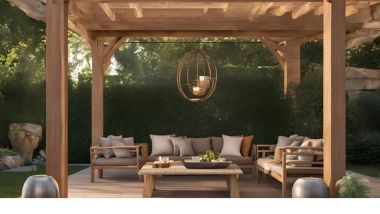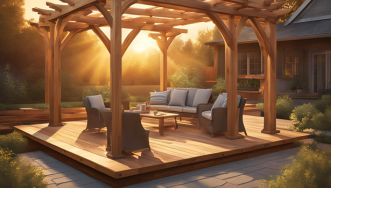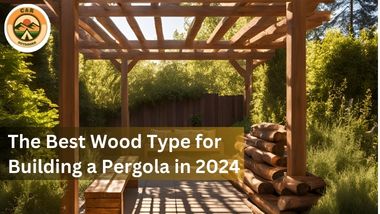Did you know that over 60% of homeowners choose wood as the primary material for their pergola? It’s no surprise as wood pergolas offer natural beauty, versatility, and durability that other materials just can’t match.
But with so many types of wood available, how do you decide which is best for your pergola project? Choosing the best wood type for building a pergola is the first step in creating that perfect backyard retreat.
Let’s explore the best wood types for building a pergola in 2024, highlighting the strengths, weaknesses, and unique qualities of each. Stick around, by the end you will know how to select the best wood that meets your needs and fits your style!
Why Choosing the Best Wood Types for Building a Pergola Matters?
When it comes to building a pergola, your choice of wood can make a big difference. The right type of wood not only adds charm to your outdoor space but also impacts how well your pergola can withstand the test of time and weather conditions.
Wood that’s durable and resistant to decay will keep your pergola looking great, even during the rainy season. Think about the heavy rain and harsh sun that could wear down your structure. Choosing the right wood will save you from constant repairs and ensure your outdoor oasis remains enjoyable year-round!
Exploring The Best Wood Types for Building a Pergola in 2024

Let’s dive into the top contenders for the best wood types for building a pergola this year. Each of these options has its own unique features that make them stand out.
Cedar – The Classic Choice
Cedar has long been a favorite for pergola builders. Its natural oils make it resistant to rot and insects, which is a huge plus for any homeowner. Plus, it has a rustic charm that adds character to your outdoor space.
Cedar is lightweight, making it easy to work with, and it looks stunning stained or left natural. Just remember, it requires some maintenance to keep it looking its best, especially during the summer months!
Redwood – For Aesthetics and Longevity
If you’re looking for a wood that’s as beautiful as it is durable, look no further than redwood. This stunning wood is naturally resistant to decay, making it a smart choice for those rainy days.
Its rich color and fine grain add a touch of elegance to any pergola structure. While it may come with a higher price tag, its longevity and visual appeal often make it worth the investment.
Pressure-Treated Pine – Budget-Friendly and Sturdy
For homeowners on a budget, pressure-treated pine is a fantastic option. This type of wood is affordable and widely available, plus it’s treated to resist rot and insects.
While it may not have the same aesthetic appeal as cedar or redwood, it offers great durability and can last for years with proper care. Just remember to give it a good stain or seal to keep it protected from the elements!
Tropical Hardwoods – Ipe, Teak, and Mahogany
If you want the ultimate in durability, tropical hardwoods like ipe and teak are hard to beat. These woods are incredibly tough and resistant to the elements, making them ideal for a freestanding pergola that stands up to rain and sun.
They can be more expensive and are often harder to work with, but the payoff is a pergola that looks stunning and lasts for decades. Plus, they require minimal maintenance and just a little oil to keep their rich colors shining!
Douglas Fir – Strength and Workability
Douglas fir is another excellent choice for building a wood pergola especially for those looking for strength and ease of use.
This wood is not only strong but also quite affordable. It holds up well against weather conditions when properly treated. With the right stain, Douglas fir can beautifully mimic the appearance of more expensive hardwoods, making it a great option for any budget-conscious homeowner.
Is Softwood or Hardwood Better for a Pergola?
Now that we’ve covered the best wood type for building a pergola, you might be wondering: is softwood or hardwood better for your project? It really depends on your specific needs and preferences.
- Durability: is a big factor. Hardwoods like redwood and tropical varieties offer superior impact resistance and longevity compared to softwoods like pine and fir. However, softwoods are often more budget-friendly and easier to work with.
- Maintenance: is another consideration. Hardwoods usually require less upkeep, making them ideal for those who want to enjoy their outdoor space without constant care. Softwoods, on the other hand, may need more frequent staining and sealing to prevent rot and decay.
So, which wood type is best for you? Consider your budget, maintenance willingness, and aesthetic desires as you make your choice!
Factors to Consider When Choosing the Best Wood for Your Pergola

When it comes to selecting the right wood, there are several key factors to keep in mind:
- Climate: If you live in a wet area, opt for naturally resistant woods like cedar or redwood and ensure to cover your pergola for rain.
- Usage: Think about how you’ll use your pergola. If it’s for year-round relaxation or entertaining, durable wood is essential.
- Aesthetic Preferences: Choose wood that complements your home’s style. A rustic cedar may fit perfectly with a farmhouse design, while sleek ipe might be better for modern homes.
- Sustainability: Look for eco-friendly options, especially if you want to support sustainable forestry practices.
Best Practices for Protecting Your Pergola Wood
Once you’ve selected the perfect wood, it’s essential to keep it protected. Here are some best practices to ensure your pergola lasts:
- Staining and Sealing: Regularly apply stain or sealant to protect against moisture and UV damage. This simple step can significantly extend the life of your wood.
- Regular Maintenance: Keep an eye on your pergola for any signs of wear. A quick check every few months can save you from more extensive repairs down the line.
- Choosing a Roof Cover: If you live in an area with heavy rain, consider adding a roof cover. This not only protects your pergola but also enhances its longevity and usability.
In Summary
Selecting the best wood types for building a pergola is crucial for creating a stunning outdoor space that lasts. Whether you choose classic cedar, elegant redwood, or budget-friendly pressure-treated pine, each wood type has unique benefits.
Consider your climate, usage, and maintenance preferences to make the best choice for your needs. With the right wood and a little TLC, your pergola will be a beautiful and functional addition to your backyard for years to come.
